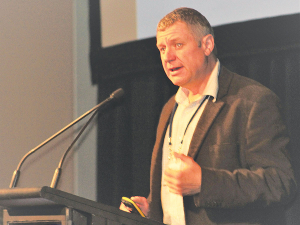Could ag come later in climate change action?
Diplomatic representatives speaking yesterday in Auckland believe there is a strong chance of global agreement in the upcoming climate negotiations in Paris in December.
 Climate scientist Dave Frame (pictured) and former climate change negotiator Adrian Macey argue why NZ bureaucrats and politicians need to adopt the more accurate measurement of livestock methane emission GWP*.
Climate scientist Dave Frame (pictured) and former climate change negotiator Adrian Macey argue why NZ bureaucrats and politicians need to adopt the more accurate measurement of livestock methane emission GWP*.
In their report for BusinessDesk, Adrian Macey and Dave Frame point out that the 30-year-old metric chosen by the UN to measure the different greenhouse gases (known as GWP100) is inaccurate for short-lived gases - such as methane.
"It greatly overstates the warming caused by NZ's methane in relation to the Paris Agreement's long-term temperature goal. Recent work by scientists has solved the problem by devising a different metrict, GWP*, which is an adaptation of GWP100 that very accurately replicates methane's actual warming."
Macey and Frame point out how even the latest IPCC (Intergovernmental Panel on Climate Change) report sums up the shortcomings of GWP100:
"Expressing methane emissions as CO2-equivalent using GWP100 overstates the effect of constant methane emissions on global temperature by a factor of 3 to 4, while understating the effect of any new methane emission source by a factor of 4 to 5 over the 20 years following the introduction of the new source."
However, the pair report that rather than adopt this 'simple fix', NZ government climate-change advisers have either ignored GWP* or dismissed it.
They add that while GWP* is attracting growing interest internationally, a small number of mainly European academics are 'hell-bent' on dissuading policymakers from having anything to do with it.
Macey and Frame explain these objections centre not on the metric itself, nor the science behind it, but on how policymakers would apply it.
"It's feared it would be used to justify a 'free ride' for agriculture or for NZ," they argue. "The 'free ride for farmers' charge is heard here, too. Suppositions about a metric's use for policy don't weaken the case for knowing methane's true impact on global temperature."
The pair also outline how and why NZ policy advice has been wrong on GWP*.
They criticise both the Climate Change Commission and the Ministry for the Environment for "a lack of understanding of the origin and purpose of carbon budgets" and for "a disconnect between measuring emissions and their warming".
Meanwhile, Macey and Frame believe that despite bureaucratic opposition to GWP*, there has been recent progress in understanding the importance of accounting accurately for warming.
"Until GWP* is adopted here, separate reporting of methane can achieve a similar result, though less conveniently than by using GWP"," they say.
"NZ's split gas domestic target is consistent with this approach, which would also be useful in carbon markets."
There was much theatre in the Beehive before the Government's new Resource Management Act (RMA) reform bills were introduced into Parliament last week.
The government has unveiled yet another move which it claims will unlock the potential of the country’s cities and region.
The government is hailing the news that food and fibre exports are predicted to reach a record $62 billion in the next year.
The final Global Dairy Trade (GDT) auction has delivered bad news for dairy farmers.
One person intimately involved in the new legislation to replace the Resource Management Act (RMA) is the outgoing chief executive of the Ministry for the Environment, James Palmer, who's also worked in local government.
T&G Global says its 2025 New Zealand apple season has delivered higher returns for growers, reflecting strong global consumer demand and pricing across its Envy and Jazz apple brands.

OPINION: The release of the Natural Environment Bill and Planning Bill to replace the Resource Management Act is a red-letter day…
OPINION: Federated Farmers has launched a new campaign, swapping ‘The Twelve Days of Christmas’ for ‘The Twelve Pests of Christmas’ to…